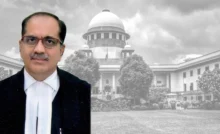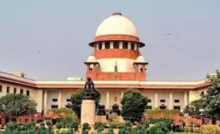The Supreme Court in the case Anjuman Intazamia Masazid Varanasi v. First Additional District Judge Varanasi and Ors observed wherein the mosque committee has moved challenging the order of Allahabad High Court holding that a batch of civil suits by Hindu parties are pending before a Varanasi civil court which are not barred by the Places of Worship Act, 1991.
The said suit was filed in the year 1991 by Hindu worshippers and on behalf of deities, seek the right to worship in the Gyanvapi mosque and the restoration of the temple at the disputed site. The bench comprising of Justice DY Chandrachud, and Justices JB Pardiwala and Justice Manoj Misra in the case was hearing the special leave petition filed by Anjuman Intazamia Masazid Varanasi against the order of High Court dated December 19.
In the present case, the mosque committees moved the plea with the other special leave petitions on the said issue. The counsel, Senior Advocate Huzefa Ahmadi, appearing for the mosque committee, submitted before the court that the SLP is in relation to the order of High Court’s holding the oldest suit i.e., the 1991 suit to be maintainable.
He also stated that there are other SLPs filed against the High Court order which relates to the subsequent suits to be filed in 2021 and later seeking right to worship.
On the other hand, the counsel, Senior Advocate CS Vaidyanathan, appearing for the plaintiffs, submitted before the court that the Supreme Court has earlier refused to interfere with the appointment of commissioner. Earlier, the petitions were filed by the Anjuman Intezemia Masajid Committee Varanasi in relation to the suits are pending before the Supreme Court.
Therefore, the bench decided to tag the present matter with the connected matters.
Facts of the Case:
The High Court in an impugned order stated that the Places of Worship, the Special Provisions Act 1991, which prohibits the conversion of religious structures from their status as of independence, does not bar the ongoing civil suits regarding the Gyanvapi dispute. It has also been that the religious character of the complex, as it existed on August 15, 1947 is to be determined by the Varanasi civil court. The Trial Court is currently hearing a suit relating to the ownership, religious character, and worshipping rights.
The High Court observations came amidst arguments by the mosque committee citing the Din Mohammad case, wherein it claimed that the religious character was already settled. The court in the case noted that the Din Mohammad case did not establish the religious character of the disputed site. The High Court in the case observed and has allowed the Archaeological Survey of India, ASI to proceed with the survey of the Gyanvapi complex.





